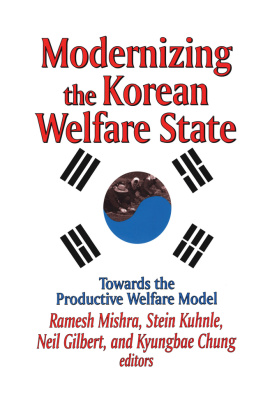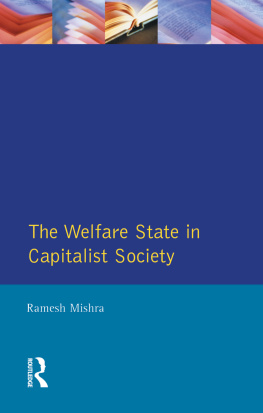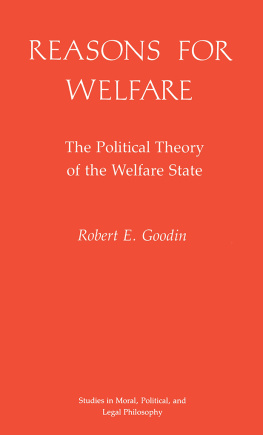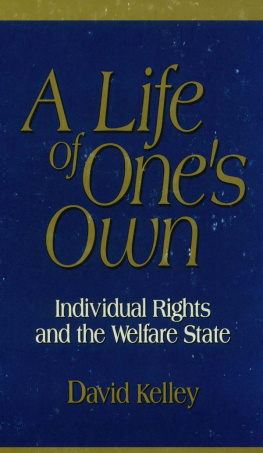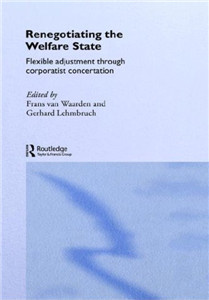Modernizing the Korean Welfare State
Modernizing the Korean Welfare State
Towards the Productive Welfare Model
Ramesh Mishra , Stein Kuhnle , Neil Gilbert , and Kyungbae Chung
editors
First published 2004 by Transaction Publishers
Published 2017 by Routledge
2 Park Square, Milton Park, Abingdon, Oxon OX14 4RN
711 Third Avenue, New York, NY 10017, USA
Routledge is an imprint of the Taylor & Francis Group, an informa business
Copyright 2004 by Taylor & Francis.
All rights reserved. No part of this book may be reprinted or reproduced or utilised in any form or by any electronic, mechanical, or other means, now known or hereafter invented, including photocopying and recording, or in any information storage or retrieval system, without permission in writing from the publishers.
Notice:
Product or corporate names may be trademarks or registered trademarks, and are used only for identification and explanation without intent to infringe.
Library of Congress Catalog Number: 2003060384
Library of Congress Cataloging-in-Publication Data
International Symposium on Sharing Productive Welfare Experience (2001:
Seoul, Korea)
Modernizing the Korean welfare state: towards the productive welfare
model / Ramesh Mishra ... [et al.], editors.
p.cm.
Chiefly papers on the International Symposium on Sharing Productive
Welfare Experience, held in Seoul, September 2001.
Includes bibliographical references and index.
ISBN 0-7658-0221-X (cloth: alk. paper)
1. Korea (South)Social policyCongresses. 2. Korea (South)Eco
nomic policy1960Congresses. 3. Welfare stateCongresses. I. Mishra,
Ramesh, Dr. II. Title.
HN730.5.A8162 2001
361.6'1'095195dc22
2003060384
ISBN 13: 978-0-7658-0221-7 (hbk)
The chapters in this book (except ) are based on a set of papers presented at an international symposium held in Seoul in September 2001. The symposium brought together a group of leading scholars to consider the new departure in Korean social policy known as "Productive Welfare." The symposium was convened under the auspices of the Ministry of Health and Welfare of Korea and the World Bank, and organized by the Korean Institute for Health and Social Affairs (KIHASA). Subsequently KIHASA coordinated the collection of revised papers and provided secretarial and editorial assistance in the preparation of this volume. The final editing and preparation of the manuscript for publication was supervised by Stein Kuhnle at the Department of Comparative Politics, University of Bergen, Norway, with the secretarial assistance of Christine S. Nipen.
We would like to acknowledge the sponsorship, funding and support of the Ministry and the World Bank, and KIHASA for organizing the symposium as well as preparing this volume. We thank our contributors for their prompt response and cooperation in answering our queries and revising the papers.
The Editors
Introduction
Ramesh Mishra
The closing years of the last millennium saw a number of significant developments in South Korea (henceforth Korea). The country joined the OECD group of nations in 1996, was engulfed in a serious financial crisis in 1997, followed by a large bail-out loan from the IMF and for the first time elected a candidate from the opposition partyKim Dae-Jungas president who took office in 1998. These developments formed the context in which a symposium (International Symposium on Sharing Productive Welfare Experience) was held in Seoul, in September 2001. This volume brings together the papers presented at the symposium and two others especially prepared for this volume.
The focus of the International Symposium was "Productive Welfare"a comprehensive approach to social welfare elaborated by the administration of President Kim Dae-Jung. The aim of this approach is to achieve a dynamic and progressive balance between efficiency and equity, between economic growth and social justice or, more broadly, between economic and social development. The articulation of this approach to welfare followed the financial crisis of 1997-98 whose aftermath revealed the limitations and weaknesses in Korea's existing social safety nets. However the Productive Welfare approach is more than a matter of strengthening the social safety nets in respect of unemployment insurance and social assistance. It aims at a thorough overhaul of the system of social protection informed by the principles of universality, comprehensiveness and social rights. The idea seems to be to fashion a system of social protection more in keeping with the needs of a country that is relatively advanced industrially, a member of the OECD nations, ready to embrace globalization and wishes to strengthen its fledgling democracy.
Although the financial crisis and the bailout loan provided by the IMF have been the trigger for the recent reforms, the conception of welfare underlying the new approach and the policies that have been implemented owe a great deal to President Kim Dae-Jung's social and political vision. Concern with social justice and equity is a notable feature of this vision. However Productive Welfare is also concerned with ensuring that the expanded system of welfare does not hamper work incentives, is sustainable and helps rather than hinders efficiency and economic growth. While the nature and significance of the new welfare paradigm and the reforms that are being carried out under its auspices remain a matter of some controversy (reflected in the symposium papers) there is little doubt that they represent an ambitious attempt to modernize, develop and consolidate the Korean welfare state. Moreover their significance may well extend far beyond Korea. For this new orientationtowards a comprehensive welfare state based on social rightssuggests a path breaking development in the East Asian context. The successful implementation and consolidation of the new social policies could conceivably have far reaching implications for the development of welfare in the rest of East and South Asia. Thus the theoretical and practical issues raised in this book have implications that go beyond the development of social policy in Korea.
The chapters in this volume are concerned with assessing the principles and policies of the new welfare paradigm. But they also address the problem of designing and implementing the new policies. The chapters divide logically into two main groups. A small group of chapters () addresses specific issues and areas of policy.
In different ways the chapters in workable measures" that will enhance regard for welfare while maintaining the value of stimulating productive energy in the market economy.
In recent years globalization has emerged as a key issue in relation to the political economy of nation states. Mishra () argues that Korea's Productive Welfare approach needs to be understood in this international context. He outlines the differing ways in which globalization is impacting on less developed countries, emerging market economies, former communist countries, and Western industrialized countries. Emerging market economies such as Mexico and Korea have been particularly vulnerable to the sudden destabilization of their economies as a consequence of financial openness resulting in a serious impact on employment, wages and living standards more generally. The problem is often compounded by fiscal austerity and other conditionalities set by international agencies such as IMF and World Bank in connection with bail out loans. Globalization also tends to undermine the national strategies of welfare or 'social protection by other means' (e.g. private sector full employment, company welfare) developed by East Asian and other countries necessitating a change in social policy. However as the contrasting cases of Mexico and Korea show how countries respond to these challenges depends on domestic economic and political configurations. For Mishra, the interaction between the global and the national provides the essential context for understanding the dynamics of welfare.


